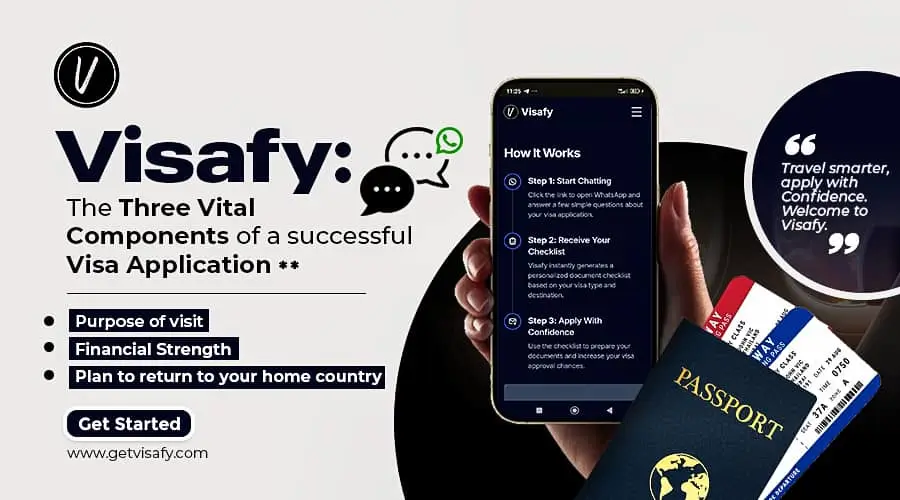· 5 min read
The Three Vital Components of a Successful Visa Application
Learn the three essential pillars of a successful visa application: purpose of visit, financial strength, and plan to return. Boost your approval chances by aligning your documents with what visa officers really look for.

The Three Vital Components of a Successful Visa Application Applying for a visa can feel like navigating a maze, but understanding the key components of a strong application can significantly increase your chances of approval. Visa officers are not emotional decision-makers; they are logical evaluators whose job is to assess whether you meet the criteria to enter their country. Their role is to filter applicants, allowing only those who demonstrate they will add value to the host country and not become a burden on its social welfare system. To succeed, your visa application must clearly communicate three vital components: Purpose of Visit, Financial Strength, and Plan to Return to Your Home Country. Let’s break these down in detail.
1. Purpose of Visit
The first thing a visa officer looks for is a clear and compelling reason for your travel. Your purpose must be straightforward, well-documented, and aligned with your current status.
- Be Specific: Simply stating “tourism” or “study” is not enough. You must provide detailed evidence to support your claim. For example, if you’re traveling to study, include your admission letter from the educational institution, course details, and how this program aligns with your career goals.
- Show Connection: Demonstrate a strong link between your current situation and your planned purpose. For instance, if you’re applying for a student visa, explain how your previous education or work experience has prepared you for this program and how it will benefit your future.
- Evidence is Key: Always back up your purpose with official documents, such as invitation letters, conference registrations, or enrollment confirmations. Remember, the visa officer needs to see that your travel plans are genuine and well thought out.
2. Financial Strength
One of the most common reasons for visa rejection is insufficient proof of financial capability. Visa officers need to be confident that you can support yourself during your stay without relying on the host country’s resources.
- Show Proof of Funds: Provide bank statements, payslips, or sponsorship letters to demonstrate you have enough money to cover your expenses.
- Explain the Source of Funds: It’s not enough to show a large bank balance. You must also prove how the money was earned. For example, if you’re employed, include your employment contract and recent payslips. If you’re self-employed, provide business registration documents and tax returns.
- Future Financial Stability: Show how you will replenish your funds during your stay. For instance, if you’re being sponsored, include your sponsor’s employment contract or proof of regular income. The financial requirements vary depending on whether you’re self-sponsoring or being sponsored, so ensure you provide the appropriate documentation for your situation.
3. Plan to Return to Your Home Country
Visa officers need assurance that you will return to your home country after your visit. Overstaying is a major concern, so you must demonstrate strong ties to your home country that compel you to return.
- Show Ties to Your Home Country: Provide evidence of what you’re returning to, such as a job (include an employment letter stating your expected return date), family, property ownership, or ongoing education.
- Explain the Value of Your Trip: For students, explain how the program will benefit your career prospects in your home country. For tourists, highlight your commitments at home, such as a job or family responsibilities.
- Provide Proof: Include documents like property deeds, lease agreements, or letters from your employer confirming your return. Your ability to demonstrate a compelling reason to return home is just as important as your purpose for traveling.
Why These Components Are Intertwined
These three components—Purpose of Visit, Financial Strength, and Plan to Return—are deeply interconnected. A strong purpose of visit is meaningless without the financial means to support it, and both are undermined if you cannot prove you’ll return home. Visa officers assess your application holistically, looking for consistency and credibility across all three areas. For example:
- A student visa applicant must show admission to a program (purpose), proof of tuition payment and living expenses (financial strength), and a clear plan to return home after graduation (return plan).
- A tourist visa applicant must provide a detailed itinerary (purpose), evidence of sufficient funds for the trip (financial strength), and proof of employment or family ties at home (return plan).
Conclusion
Your visa application is a reflection of your preparedness and credibility. Visa officers rely on the evidence you provide to make their decision, so it’s crucial to present a clear, consistent, and well-documented case.
By focusing on these three vital components—Purpose of Visit, Financial Strength, and Plan to Return—you can build a strong application that stands out to visa officers. Remember, your documents are your voice in the application process. Make sure they say, “It’s me you need in your country.”
At Visafy, we’re here to help you navigate this process with confidence. Start chatting with us on WhatsApp today to get your personalized visa checklist and take the first step toward a successful visa application.
Travel smarter. Apply with confidence. Welcome to Visafy.
